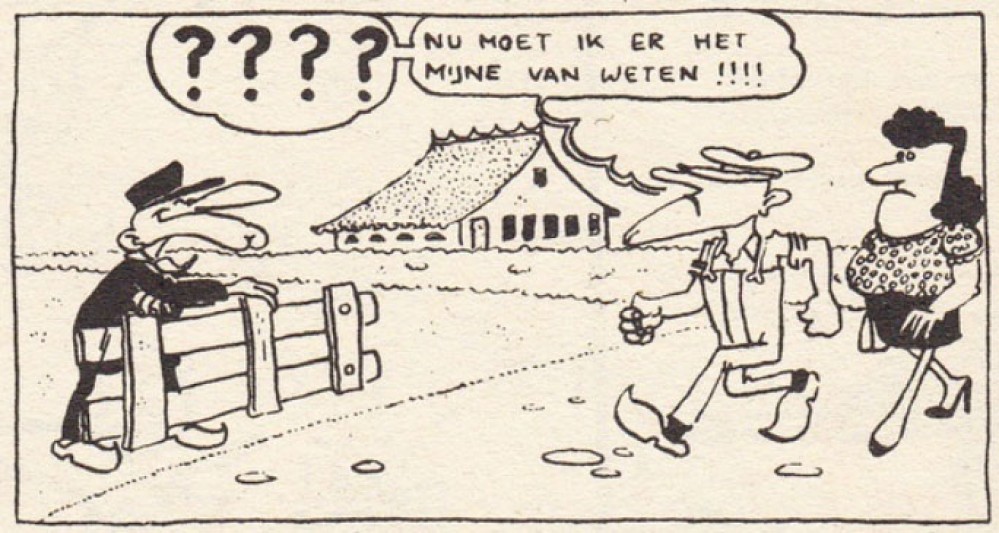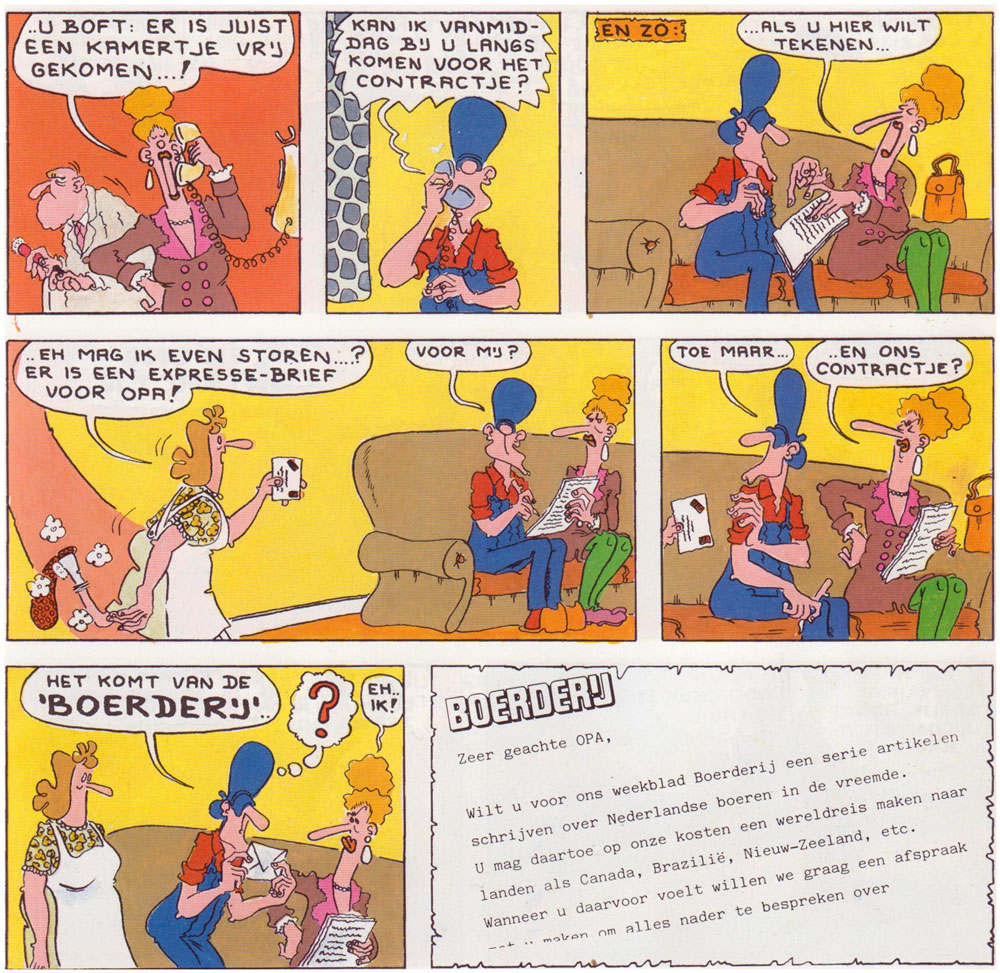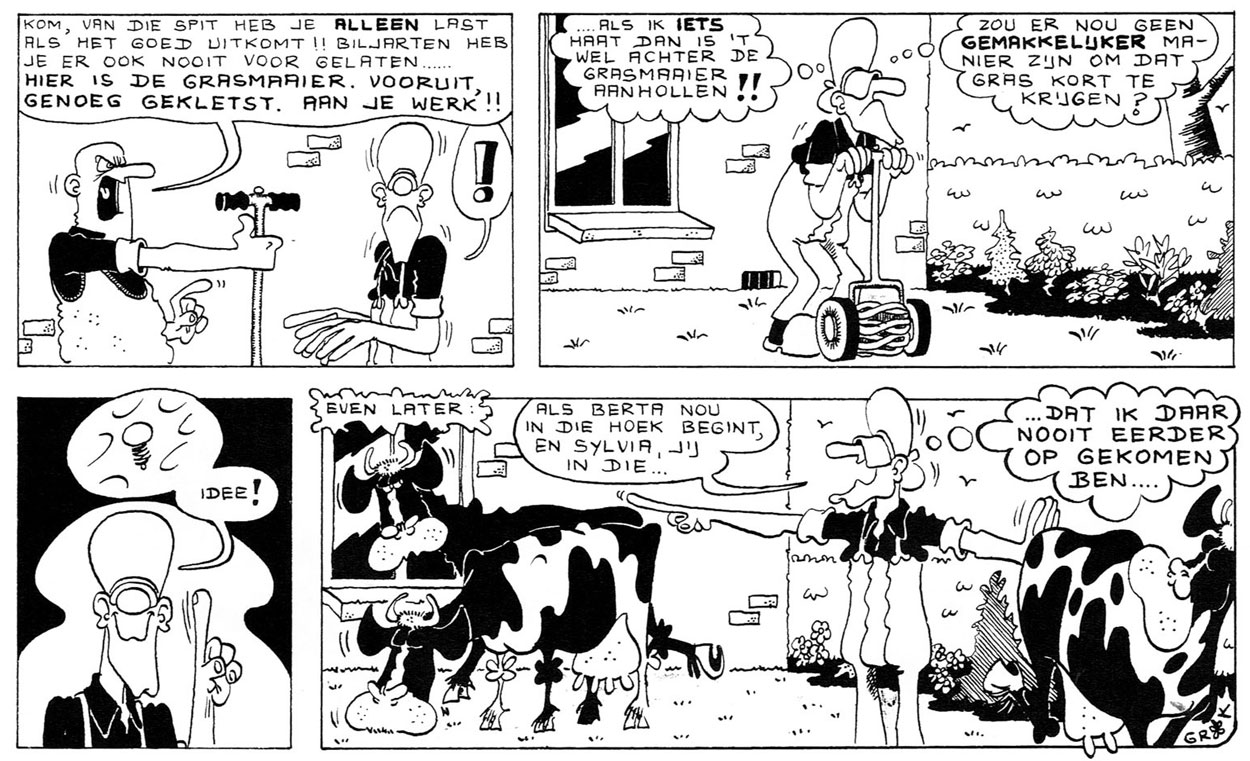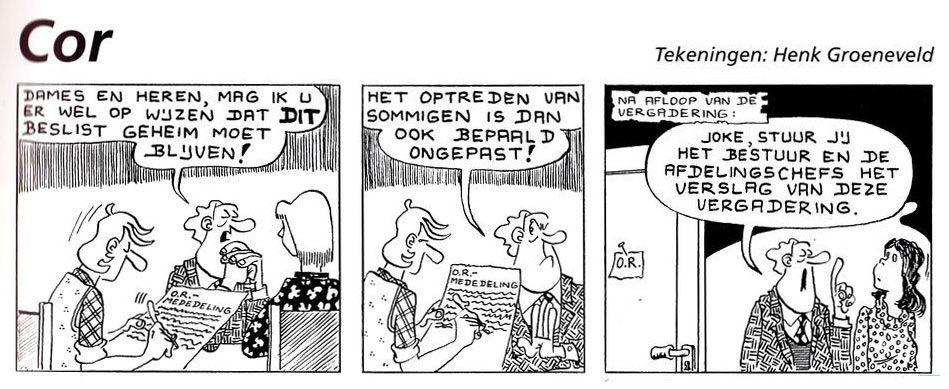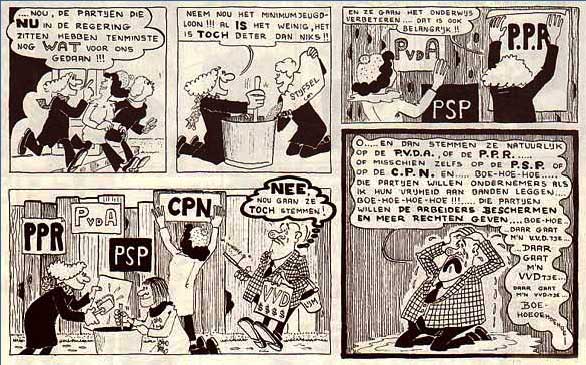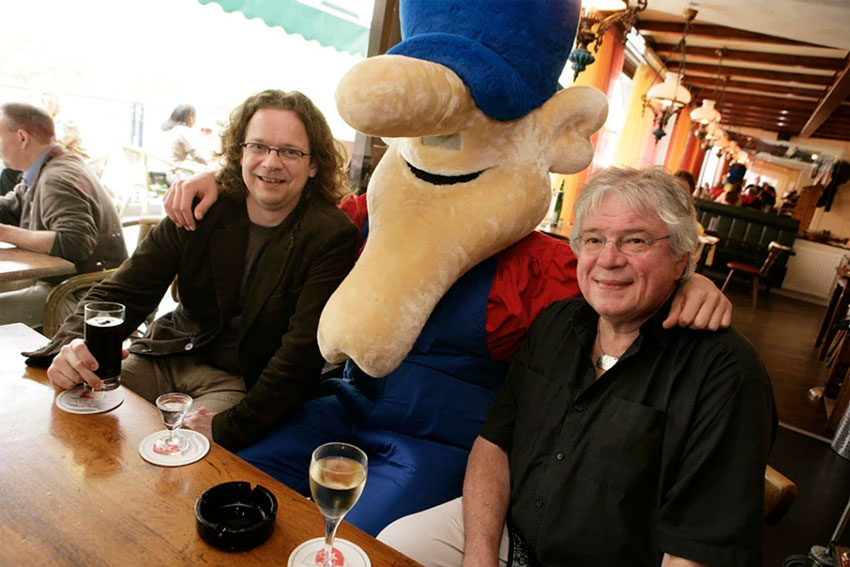'Opa bij de Emigranten' (1986).
Henk Groeneveld was a Dutch comic artist, most notable for his long-running gag comic 'Opa' (1971-2004), published in the farmer's magazine Boerderij, which has since been continued by his successor Herman Roozen. After 'Jan, Jans en de Kinderen' (originally created in 1970 by Jan Kruis), 'Opa' is the second longest-running weekly comic series in The Netherlands that has remained in continuous production. The popularity of 'Opa' has led to various merchandising adaptations. The cartoonist Henk Groeneveld should not be confused with Dutch businessman Henk Groeneveld (b. 1954).
Early life and career
Henk Groeneveld was born in 1946 in Vlaardingen, Zuid-Holland. Contrary to what one would expect, he wasn't born on a farm, nor had any agrarian background. As a child, he developed a keen passion for drawing, fuelled by Frans Piët's 'Sjors en Sjimmie' stories, and the weekly comic magazines Donald Duck and Pep. In an interview with Stripschrift (#419, November 2011), he particularly mentioned the French comic 'Sylvia' by Martial as an early inspiration. However, Groeneveld moved on to study cultural anthropology, with a strong passion for Polynesia, and graduated in 1973. By then, he was however already working steadily as a cartoonist for magazines and pamphlets published by trade unions, as well as educational, health care and youth care organizations. During his professional life, he lived and worked in Utrecht.
Early appearance of 'Opa'.
Opa
Groeneveld's mother-in-law was a garden architect with a gardening advice column in the farmer's newspaper Boerderij. Through her, he learned that the paper was about to change into a weekly magazine format, which prompted him to submit the concept for a gag comic to the editors. His proposal was accepted and in September 1971, 'Opa' became a long-running mainstay in Boerderij. The title character is a grumpy senior farmer, simply named 'Opa' ("Grandpa"), who provides his idiosyncratic commentary on the daily worries of farm life. Graphically reminiscent of Reg Smythe's 'Andy Capp', the character was inspired by Groeneveld's own grandfathers, of whom one was "very wise" and the other "not as much". Groeneveld used to sign his strips with the pen name Grok, or Gr*k (with the "o" in the shape of a flower). Over the years, many 'Opa' gags were provided by children's book writer Hannah Kraan. Her episodes are signed with an "H" with a circle around it.
Opa lives in the fictional town of Bovenscheveen, close to the equally fictional city of Zwaagdam. A widower for many years, he tries to run his farm with help from his son and daughter-in-law, as well as his grandson Thijs and his wife Loes. The family also has a dog named Bertus. Opa often interacts with fellow farmers Herman Van Beusekom, Meulenbelt, Van Kriel, Theunissen, Harmssen and Kwaaistra, who switch between being his friends and rivals. On occasion, Opa visits a local bar, De Gouden Leeuw, run by bartender Koop. Among the other recurring villagers are the nameless town doctor, the vet Van Deeters, the industrials The Cooiman Brothers and the hotel owners the Schneesicht Sisters.
Cover for 'Opa' book collections.
'Opa' was printed on the back page of each issue and quickly became popular with readers. Several of his antics were collected in books, published since 1976 by C. Misset and, from 2004 on, by Reed Business Information. A notable book release was 'Opa bij de Emigranten' (1986), a full-length story with the character, published in color. The feature has also spawned merchandising, like overalls, farm equipment, mugs, playing cards, shirts and truck decoration figurines. Groeneveld drew 'Opa' for more than 33 years. Despite the thematic gimmick, he never ran out of ideas. His editors only complained if Opa hadn't been seen on his farm for a few episodes. At a certain point, Groeneveld was even told to no longer let Opa go on wintersport holidays or spend so much time in bars.
After three decades, health issues with his hands made it more difficult for Groeneveld to keep on writing and drawing, so on 23 March 2004, 'Opa' was taken over by Herman Roozen. Roozen made some slight changes in design, alongside modernizations of Opa's farming techniques and personal possessions, like a cell phone and a computer. Previously a black-and-white series, Roozen also started to digitally colorize new episodes. Groeneveld only asked Roozen to no longer use the Scheesnicht ladies as cast members, since he considered them his personal creations. In the same year as his retirement, a compilation of Groeneveld's best 'Opa' strips was published under the title 'Het Beste van Opa' (Reed Business Information, 2004).
'Cor'. Translation: "Ladies and gentlemen. I should point out that THIS ought to remain a secret. The actions of certain others are therefore quite uncalled for." - After the meeting: "Joke, send the management and the department chiefs the report of this meeting."
Cor
Another long-running comic strip by Henk Groeneveld was 'Cor', which appeared in Praktijkblad voor Medezeggenschap and later in Ondernemings Raad, specialized magazines for works councils. Together with writer Hugo Klooster, Groeneveld created the comic book 'Cor in Strip' (Welboom, 1980), containing 60 copyright-free comic strips, free to use in annual reports and other publications of works councils. Groeneveld's 'Cor' strips have appeared in Ondernemings Raad well into the 21st century.
Comics in Stripje and Werkende Jeugd
Between 1973 and 1976, Henk Groeneveld made comics for Stripje, a magazine aimed at working youth and pupils from lower vocational education. He was instructed to have his comics arouse the youth's interest in social problems and to stimulate discussion, for instance through portraying the experiences of other working youth. Contributing scriptwriters were Anton Ferdi and Sonja van der Gaast. In a similar vein, Groeneveld also began working as a comic artist and illustrator for Werkende Jeugd, the magazine of the Catholic Working Youth association KWJ. In addition, he has created comics to accompany educational television programs, like the 1970s comic booklet 'Historia de America Latina'. In 1978, the KWJ released a book compilation of Groeneveld's comic strips for Stripje and Werkende Jeugd.
Comic by Henk Groeneveld for Stripje #13 (March 1974).
Kop Op
Tying in with the 1974 Episcopal Letter, Henk Groeneveld made the comic book 'Kop Op' (1974), by commission of the Secretariat of the Roman Catholic Church Province in the Netherlands. The book was also translated into Spanish and Italian.
Recognition
On 29 September 2007, during the Stripdagen comic festival in Houten, Henk Groeneveld was awarded the Bulletje & Boonestaakschaal for his work on the long-running 'Opa' comic in Boerderij. On the occasion of the character's 40th anniversary in 2011, the Fries Landbouwmuseum hosted an exhibition dedicated to Groeneveld and Roozen's 'Opa'.
Death
Henk Groeneveld died in 2025, at age 79.
Herman Roozen, Opa and Henk Groeneveld in 2007. Photo: Michel Zoeter.


